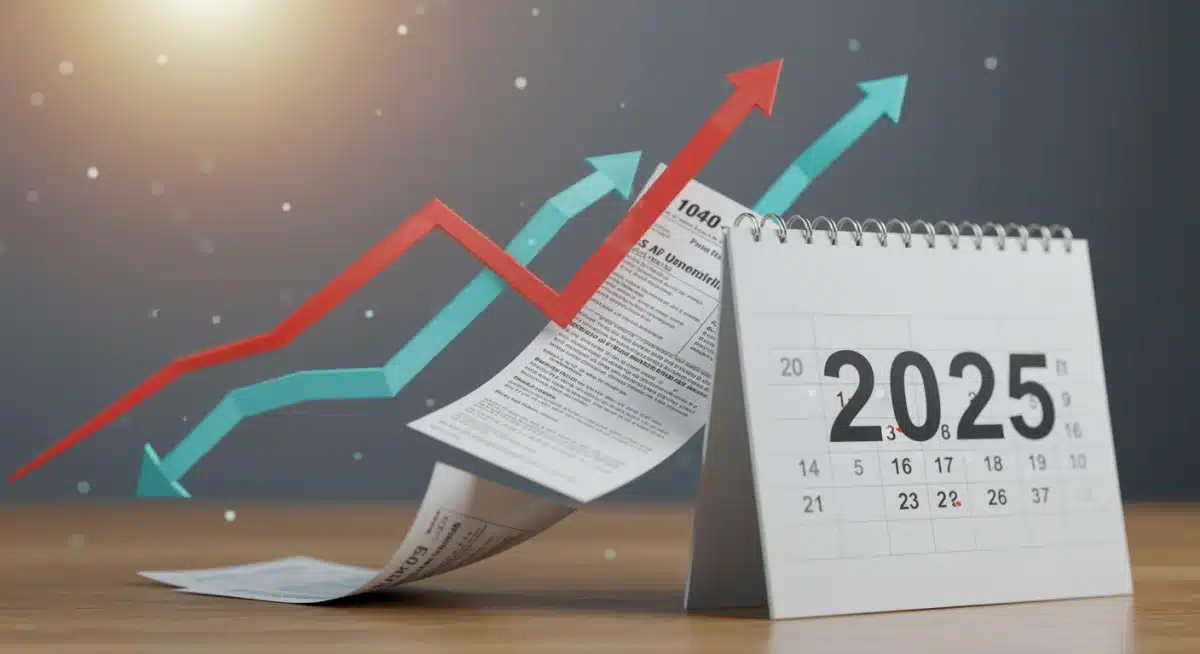2025 Tax Code Changes: Impact on Your Investment Portfolio

The 2025 tax code changes are poised to significantly alter the landscape for investors, potentially impacting portfolios by up to 15% through modifications to capital gains, estate taxes, and retirement accounts, necessitating proactive financial review.
Are you ready for the seismic shifts coming to your finances? The impending 2025 tax code changes are more than mere adjustments; they represent a significant overhaul that could profoundly impact your investment portfolio, potentially by as much as 15%. Understanding these new regulations is crucial for safeguarding and growing your wealth.
Understanding the Looming 2025 Tax Code Changes
The year 2025 marks a pivotal moment for tax policy in the United States. Many provisions from the Tax Cuts and Jobs Act (TCJA) of 2017 are set to expire, leading to widespread changes that will affect individuals and businesses alike. These expirations will revert certain tax rates and deductions to pre-TCJA levels, creating a new financial environment that investors must navigate with careful planning and foresight.
These changes are not merely administrative; they will directly influence investment strategies, retirement planning, and wealth transfer. From individual income tax rates to estate tax exemptions, almost every facet of financial life touched by the tax code will see some form of alteration. Staying informed is the first step toward mitigating potential negative impacts and identifying new opportunities.
The expiration of key provisions means that certain tax benefits enjoyed in recent years will sunset, leading to higher tax liabilities for many. This necessitates a thorough review of current investment holdings and a re-evaluation of long-term financial goals. Without proper preparation, investors could face unexpected financial burdens.
Impact on Capital Gains and Investment Income
One of the most significant areas affected by the 2025 tax code changes is capital gains. The current favorable rates for long-term capital gains, often a cornerstone of investment growth, are likely to see adjustments. These changes could lead to a higher tax burden when selling appreciated assets, directly reducing your net returns.
Potential Rate Increases
- Long-Term Capital Gains: Expect potential increases in the tax rates applied to assets held for more than one year. These rates are currently 0%, 15%, or 20% depending on income, and could revert to higher thresholds.
- Qualified Dividends: Similar to long-term capital gains, qualified dividends are typically taxed at preferential rates. These rates are also tied to the expiring TCJA provisions and may face upward adjustments.
- Net Investment Income Tax (NIIT): The 3.8% NIIT on certain investment income for high-income earners is likely to remain, but its interaction with other changed rates could amplify the overall tax bite.
For investors accustomed to the current rates, these shifts mean that the after-tax return on their investments could diminish. This makes it crucial to consider the tax efficiency of your portfolio. Strategies such as tax-loss harvesting or investing in tax-advantaged accounts become even more critical in this evolving landscape.
The exact percentage of impact will vary based on individual income levels and investment types, but a general increase in capital gains taxes could reduce overall portfolio growth by several percentage points. This requires investors to re-evaluate their asset allocation and selling strategies to minimize tax exposure.
Estate and Gift Tax Modifications
The 2025 tax code changes will also bring substantial modifications to estate and gift taxes. The current historically high exemption amounts, which allow individuals to transfer significant wealth free of federal estate and gift taxes, are scheduled to be cut in half. This change has profound implications for high-net-worth individuals and families planning for intergenerational wealth transfer.
For those with substantial assets, the reduced exemption means a larger portion of their estate could be subject to federal estate tax, which currently carries a top rate of 40%. This could significantly erode the wealth passed down to heirs, making proactive estate planning more urgent than ever.
Key Changes to Watch For
- Exemption Reduction: The federal estate and gift tax exemption is projected to fall from over $13 million per individual in 2024 to approximately $7 million in 2025 (adjusted for inflation).
- Portability: While portability of the unused exemption between spouses is expected to remain, the reduced base amount will still impact overall planning.
- Gift Tax Strategies: Individuals considering large gifts to reduce their taxable estate may need to accelerate these plans before the exemption decreases.
These adjustments necessitate a fresh look at existing estate plans, trusts, and gifting strategies. Without timely action, families could face unexpected and substantial tax liabilities, potentially reducing the legacy they wish to leave behind. Consulting with an estate planning attorney and financial advisor is paramount to understanding and navigating these complex changes effectively.
Retirement Account Implications
Retirement accounts, often seen as shielded from immediate taxation, will also feel the ripple effects of the 2025 tax code changes. While direct changes to contribution limits or tax-deferred status are less likely, the broader adjustments to individual income tax rates will influence the attractiveness and efficacy of various retirement savings vehicles. Many investors utilize traditional IRAs and 401(k)s for tax deductions, and Roth accounts for tax-free withdrawals in retirement. The interplay of these account types with new tax brackets will be critical.

For instance, if individual income tax rates increase, the value of current deductions for traditional IRA and 401(k) contributions becomes potentially greater, as you are deferring taxes at a higher rate. Conversely, if you expect tax rates to be even higher in retirement, a Roth conversion might become more appealing now, despite paying taxes on the conversion at current rates.
Strategic Retirement Planning Adjustments
- Roth Conversions: Consider accelerating Roth conversions before potential income tax rate increases take effect, locking in current rates for future tax-free withdrawals.
- Contribution Maximization: Maximize contributions to tax-advantaged accounts like 401(k)s and IRAs, especially if you anticipate higher tax brackets in the future.
- Investment Mix: Re-evaluate the types of investments held within taxable versus tax-advantaged accounts to optimize tax efficiency, placing high-growth assets in tax-sheltered vehicles.
Understanding how these rate changes affect your personal financial situation is key. A comprehensive review of your retirement strategy, considering current and projected tax rates, will help ensure your nest egg remains robust and grows efficiently under the new tax regime. This proactive approach can help mitigate the impact of the 2025 tax code changes on your long-term financial security.
Strategies to Mitigate the 15% Portfolio Impact
With the potential for a 15% impact on investment portfolios due to the 2025 tax code changes, proactive strategies are essential. It’s not enough to simply react; investors must anticipate and adapt to the new environment. The goal is to minimize tax liabilities while maximizing after-tax returns, preserving the growth of your wealth.
One primary strategy involves re-evaluating your asset location. This means strategically placing different types of investments in the most tax-efficient accounts. For example, highly taxed assets like bonds or REITs might be better suited for tax-deferred accounts, while growth stocks that generate long-term capital gains could be held in taxable accounts if their gains are managed through tax-loss harvesting.
Actionable Mitigation Tactics
- Tax-Loss Harvesting: Utilize losses in your taxable accounts to offset capital gains and potentially a limited amount of ordinary income. This strategy becomes even more valuable if capital gains rates increase.
- Review Asset Allocation: Adjust your mix of stocks, bonds, and other assets to align with new tax implications and your risk tolerance. Consider diversifying into tax-efficient investments.
- Charitable Giving Strategies: Explore Qualified Charitable Distributions (QCDs) from IRAs or donor-advised funds to reduce taxable income, especially if you are charitably inclined.
Engaging with a qualified financial advisor is crucial at this juncture. They can provide personalized guidance, helping you navigate the complexities of the new tax landscape and implement strategies tailored to your specific financial situation and goals. Ignoring these changes could lead to unforeseen erosion of your investment gains.
The Importance of Professional Financial Guidance
Navigating the intricate landscape of the 2025 tax code changes requires more than just a cursory understanding; it demands expert knowledge and tailored strategies. The potential 15% impact on investment portfolios underscores the critical role of professional financial guidance. A seasoned financial advisor can offer invaluable insights, helping you understand the nuances of the new regulations and craft a robust plan to protect and enhance your wealth.
These professionals do more than just crunch numbers; they provide a holistic view of your financial situation, considering your investment goals, risk tolerance, and personal circumstances. They can identify potential pitfalls and uncover opportunities that might otherwise be overlooked, ensuring your portfolio remains resilient against tax headwinds.
Benefits of Expert Consultation
- Personalized Tax Planning: Advisors can develop strategies specific to your income, assets, and financial goals, optimizing your tax position under the new rules.
- Proactive Portfolio Adjustments: They can recommend timely adjustments to your investment holdings and asset location to minimize tax liabilities and maximize after-tax returns.
- Estate Planning Integration: Financial advisors often work in conjunction with estate planning attorneys to ensure your wealth transfer strategies align with the updated estate and gift tax exemptions.
The complexity of these changes means that a DIY approach might lead to missed opportunities or unintended tax consequences. Investing in professional advice now can save you significant amounts in taxes and ensure your financial future remains secure and aligned with your long-term objectives. Don’t underestimate the value of expertise when facing such significant regulatory shifts.
| Key Change | Brief Description |
|---|---|
| Capital Gains Rates | Long-term capital gains and qualified dividend rates may increase due to TCJA expiration. |
| Estate Tax Exemption | Federal estate and gift tax exemption amounts are projected to be significantly reduced. |
| Income Tax Brackets | Individual income tax rates and brackets are set to revert to pre-TCJA levels. |
| Retirement Planning | Changes influence Roth conversions and the tax efficiency of traditional retirement accounts. |
Frequently Asked Questions About 2025 Tax Changes
The main driver is the expiration of key provisions from the Tax Cuts and Jobs Act (TCJA) of 2017. Many individual income tax rates, deductions, and the estate tax exemption are scheduled to revert to their pre-TCJA levels, leading to significant shifts in tax policy and financial planning.
Long-term capital gains and qualified dividend tax rates are expected to increase for many investors. This could reduce after-tax returns on investments, making strategies like tax-loss harvesting and careful asset location even more crucial for optimizing portfolio performance and minimizing tax burdens.
The federal estate and gift tax exemption amount is projected to be cut almost in half. This means a larger portion of substantial estates could be subject to federal estate tax, necessitating a review of current estate plans and potentially accelerating gifting strategies for high-net-worth individuals.
With potential increases in individual income tax rates, performing a Roth conversion before 2025 could be a wise strategy. It allows you to pay taxes on the converted amount at potentially lower current rates, ensuring future withdrawals in retirement are tax-free, which could be beneficial if future rates are higher.
Professional financial guidance is crucial because the 2025 tax code changes are complex and have significant implications. An advisor can offer personalized strategies to navigate increased capital gains, reduced estate tax exemptions, and retirement account adjustments, helping to mitigate the potential 15% impact on your investment portfolio.
Conclusion
The impending 2025 tax code changes represent a critical juncture for investors, demanding a proactive and informed approach. With potential impacts of up to 15% on investment portfolios, understanding the shifts in capital gains, estate taxes, and retirement account implications is not merely advisable, but essential. By implementing strategic adjustments, such as tax-loss harvesting, re-evaluating asset allocation, and seeking expert financial guidance, investors can navigate this evolving landscape effectively, safeguarding their wealth and optimizing their financial future against the backdrop of new regulations.





